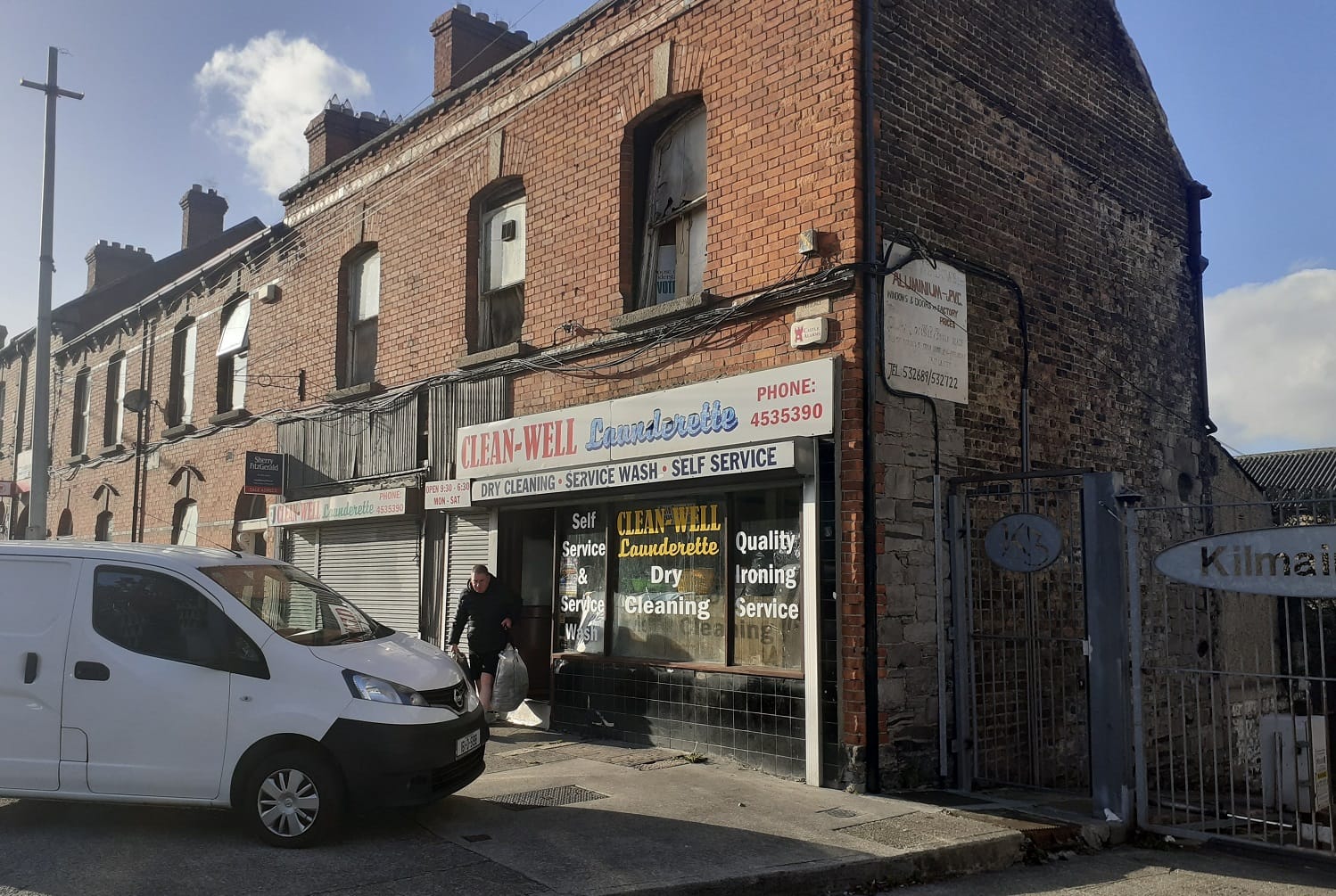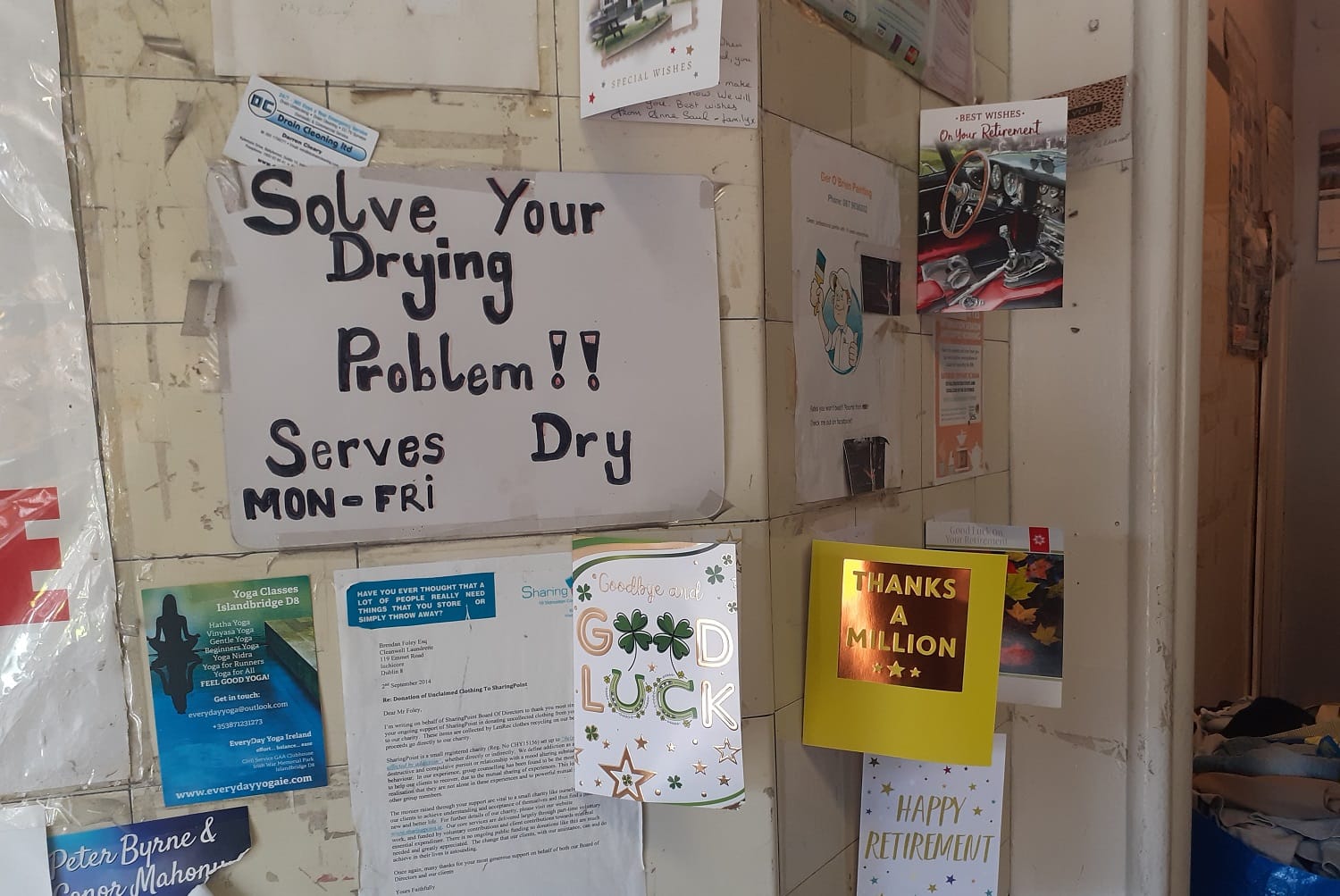What’s the best way to tell area residents about plans for a new asylum shelter nearby?
The government should tell communities directly about plans for new asylum shelters, some activists and politicians say.
“It’s an old establishment, it’s part of Inchicore,” says Peter Keegan. “Another story, another chapter.”

Peter Keegan hovers just inside the front door of the Clean-Well Washeteria. “I just came in to see you. What’s the story?” he says.
The place was supposed to be closing today, says owner Brendan Foley, on Saturday, perched where there’s a bit of space on the short bench that runs along the left wall of the laundrette.
But it’ll be a little longer. “It really depends on the man taking the machines,” he says.
He can take in Keegan’s washing if he likes, Foley says, rising from the bench.
“Will I drop the stuff down to you so?” says Keegan, jangling his keys, looking towards Foley. “Is that alright?”
“Monday, we’ll have it Tuesday,” says Foley.
Keegan kind of stopped by to ask for one last wash, but really, to say goodbye. “I’m going to miss his business terrible,” he says, earnestly.
He lives alone, he says. “And he does the work that I should be doing really, he does the washing and he does the ironing. It saves me the bother.”
Taped to the tiled wall, opposite the laundrette door, are several cards, wishing “Happy Retirement!”, and “Good Luck, next to a sign telling customers to “Solve your drying problem!!”
There’s also a sign showing when the place will be closing. The “1 week” has been replaced by “2 weeks”, and scribbled out again.
With a flick of his thumbs, Foley flips a pink towel he’s pulled out of the hot dryer into a neat fold, and places it onto a laundry basket.
More pink towels follow, into a tidy pile. “They’re from a nail bar,” he says.
When his parents – who ran a now-closed grocery store next door – opened the laundrette 50 years ago, they intended it to be self-service.
That people would bring in laundry, wash it themselves, stick it in the dryer and head home, says Foley. “But it didn’t quite work out like that.”
At the start most did their own, he says. But people gradually wanted to use that waiting time to work or run errands, he says, and the laundrette changed too.

“They’d leave it and we’d do it, and we’d have it for them when they get back,” he says.
Instruction signs on the wall still tell customers that the laundrette is self-service, and how to use the machines.
But since taking over from his parents, Foley has worked here six days a week, with the occasional help from an extra staff member, so that people don’t have to stick around.
Working at the laundrette is a bit like being on a conveyor belt, says Foley.
“It keeps going, somebody brings in stuff, they want it done, and then you forget about them, and then you say you’ll have it in two hours, and then you realise geez, I’d better get that in,” he says.
He’s never really used a system, he says. Aside from handing out tickets, which people often leave behind, expecting to be able to recognise their own laundry when they return.
But not everybody returns.
Around the corner and down the stairs is the room where the grocery shop used to be. Thick bodies of dust cover the bulging bags of fabric on top of the tall shelves.
There’s stuff in here that could be 20 years old, says Foley, gesturing up to them. Like relics of the past, he says. “Including myself.”
At the back of the room, dry-cleaned shirts hang along the wall. Underneath them are several duvets, which Foley says they have to throw out. They’re left-behinds from through the years.

Mouse traps poke out between the boxes and bags on the shelves. Mice are never far from a river and the Camac River runs out back, he says. “You just catch an odd one and then there’s no more.”
Over the years, Foley thought about getting the building knocked and using the backyard for new apartments, he says.
He put in for planning two or three times, he says. “Each time costing a lot of money, you know.”
But the applications never got through, he says. “People object and they don’t like the heights and like this and like that, and you don’t get anywhere.”
He just kept the laundrette going instead.
“I always was lucky enough that I was making a living here. That was the main thing,” he says. “If you’re making a living, the others are second really.”
But the building got tattier and the junk piled up. He’s waiting for a guy to come to clear everything away in a skip.
Dublin City Council have told him they’ll take the building, likely when its has been gutted of the stuff hoarded over the years, he says. “I think so. I’m presuming it should go ahead.”
Said a council spokesperson on Tuesday: “The Council has agreed terms for the acquisition of 119/119a Emmet Road, Inchicore, D8 and the legal process to acquire same is underway.”
“Two presents there today,” Foley says, stepping back to point at a box of chocolates and a gift bag on the bench.
“They think it’s the end of a thing. They’re a customer for life,” he says.
He points up to above the shopfront window. Bits of ceiling and thick cobwebs drape down around a hole.
“Now, because it’s here 50 years, there’s a hole in the roof,” he says lightly. He’s never gotten it fixed.
“There’s about ten reasons to retire, there’s very few for keeping going,” he says.
Machines need replacing, the place needs doing up. The energy crisis looms, he says. “All these things are getting difficult.”
The doctor says he needs a hip replacement, too. “Going down, picking up stuff and doing different things,” he says. “It’s wear and tear. I’ll be 70 next May. So you’re less good at that.”
“Now, when are you closing?” says a woman at the door, with two loads of wet laundry hauled from her car.
Most of Foley’s customers come for his dryers, he says, rustling open one of the bags which he holds between his knees, and shoving the wet clothes into a machine.
He still can’t really turn away business, he says, even though he’s closing soon. “You’re getting in that little bit of money from it.”
The woman comes back, placing the handles of a gift bag into his hands, and whisks herself away.
“Ah, just generous. People do things …” Foley moves onto another machine, dragging the wet washing out of another dryer, into a basket.

Foley is one of the reasons Keegan says he’s liked coming here. “And it’s an old establishment, it’s part of Inchicore.”
“Another story, another chapter,” says Keegan, taking in the space.
Keegan says Foley should enjoy his retirement. “He deserves a break after all these years. I can’t be selfish that way, you know,”
“It’s a strange thing,” Foley says, being around other people’s clothes all day. “You know, it is strange, but you don’t think of it.” He sits back into the bench.
“You’d nearly get to know someone,” he says, and then stands up, looking for more laundry, leaving the thought behind.
Get our latest headlines in one of them, and recommendations for things to do in Dublin in the other.